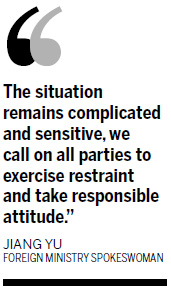Top News
Restraint needed for DPRK-ROK tensions, says FM
By Qin Jize (China Daily)
Updated: 2010-12-22 08:08
 |
Large Medium Small |

BEIJING - Foreign Ministry spokeswoman Jiang Yu on Tuesday continued to urge all parties involved to exercise restraint to avoid any further confrontation after the Republic of Korea (ROK)'s live-fire drill on a border island.
"The situation remains complicated and sensitive," Jiang told the regular press conference. "We call on all parties to exercise restraint and take responsible attitude."
She said all parties should realize that artillery fire and military force cannot solve the issues on the Korean Peninsula, and dialogue and cooperation are the only correct approaches.
Meanwhile, United States New Mexico Governor Bill Richardson praised Pyongyang on the same day for not retaliating against the artillery drills, saying the current tensions offered an opening for new multinational talks on ending Pyongyang's nuclear program.
"I noticed a pragmatic attitude on their part, a more realistic attitude," he said.
"When I pushed hard for non-retaliation, I saw a little bit of movement in a positive direction," he added.
He told reporters at the Beijing Capital International Airport that he thought it is important that a new effort at re-engagement take place among the Six-Party Talks countries.
Richardson arrived in Beijing on Tuesday after his six-day private visit to the Democratic People's Republic of Korea (DPRK). According to Jiang, there is no arrangement of any bilateral meetings between Richardson and Chinese officials.
Jiang said China welcomed all diplomatic efforts to reduce tension on the Korean Peninsula.
"China has always supported contact between the DPRK and the US and hopes such contacts can be beneficial to the resumption of the Six-Party Talks and an appropriate solution to relevant issues," she said.
In Washington, US State Department Spokesman Philip J. Crowley said on Monday that Richardson, who was on a private trip, had not been charged with negotiating on behalf of the US government.
However, Richardson would brief the US State Department upon his return.
Richardson said earlier that he had reached agreement with DPRK officials to let inspectors from the International Atomic Energy Agency (IAEA) have access to the DPRK's uranium enrichment facility.
Crowley said Richardson's declaration was not enough to restart the six-party disarmament talks that stalled for a while.
"If they meet their international obligations, take affirmative steps to reduce tensions in the region and take affirmative steps to denuclearize and to fulfill (their) promise under the 2005 joint statement, we will respond accordingly," he said.
Zhang Liangui, a professor with the Party School of the Central Committee of the Communist Party of China noted that Pyongyang's move to allow the return of UN inspectors to nuclear facilities conforms to its major diplomatic direction.
"That is not Pyongyang's compromise, but its pledge to be a nuclear nation," he said. Pyongyang's goal is to force the international community to acknowledge it as a nuclear state, he noted.
Whether it invites a US governor to visit its nuclear facilities or allows UN inspectors back into the country, he added, Pyongyang wants to impose pressure on the US and the rest of the world.
Agencies contributed to this story.
China Daily
(China Daily 12/22/2010 page11)